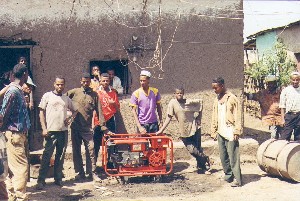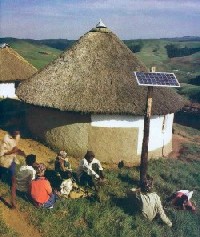The Government of Ethiopia has developed a strategy for expanding access to electricity in order to promote income generating activities and provide social services outside major urban areas. The strategy comprises two components: grid-based expansion and promotion of private sector electrification schemes in the off-grid areas, relying on different technologies including renewable energy resources. Currently, less than 2% of Ethiopia's rural population have access to the grid. In a country with over 85% of its population living and working in the rural sector, this lack of modern energy severely restricts social and economic development. It is the objective of the Ethiopian Government to radically change this situation. Working with the World Bank, and a number of other donors, Government has embarked upon a national Energy Access Project that aims to increase access to electricity and other modern energy sources to a much larger proportion of the population over the next 10 years.

The grid-based expansion component is premised on: (i) increased power
generation capacity to be secured through a mix of public and private
sector investments by the Ethiopian Electric Power Corporation (EEPCo)
and private investors respectively; and (ii) implementation of an efficiency
improvement strategy in EEPCo, including appropriate pricing of electricity.
Based on domestic and international experience, the Government has assessed that the off-grid rural electrification component would be successful provided that a number of fundamental pre-requisites are put in place. These include: (i) suitable institutional structure for promoting private investment, dissemination of information and technical know-how on investment opportunities; (ii) funding mechanism, and (iii) light-handed regulation for small off-grid systems including allowance for cost recovery tariffs. The Electricity regulations issued in 1997 already provide for full cost recovery tariffs.
A recently prepared rural electrification (RE) strategy paper describes the envisaged institutional structure and funding mechanism for rural electrification as well as the principles for decentralized and simplified regulation for small off-grid systems. The institutional framework, which is shown in the following chart, would comprise a Rural Electrification Board (REB), a Rural Electrification Secretariat (RES) and a Rural Electrification Fund (REF). The legal basis for the proposed institutional structure will be prescribed in a proclamation to be prepared and presented to parliament before end-2002.
The World Bank, under its Energy Access Program, is providing support to help establish the RES. It is supporting the Ethiopian Electric Agency (EEA) in this capacity. The EEA solicited proposals from a number of companies to carry out the design work under a project entitled: Ethiopia Energy Access Project: Design of an Institutional and Financing Framework for Rural Electrification (Rural Electrification Fund).


Energy for Sustainable Development Ltd. (ESD), working with two Ethiopian companies, MGP Ltd and ARDCO plc, were selected by the EEA to carry out this assignment. They are providing support to the EEA (the “Electricity Regulator”) to develop the legal and legislative framework for the establishment of the REB, RES and REF. It is also working with the EEA to develop the framework, the structure, the operating modalities and the management, technical assistance, personnel and capacity building requirements for the rural electrification program. ESD commenced this work on 1st October 2002, and will complete the assignment before the end of January 2003.

A team of international specialists with expertise in institutional development, management, electricity sector regulatory frameworks, tariffs, financing and rural energy have been assembled for this work. A team of highly experienced and qualified Ethiopian experts are also contracted on the project to develop the legal and legislative framework, the institutional, managerial, personnel and accounting framework for the RES, whilst also defining the project identification and support requirements, the financial and lending modalities, capacity building requirements and other key aspects to get the RES operational as soon as possible.